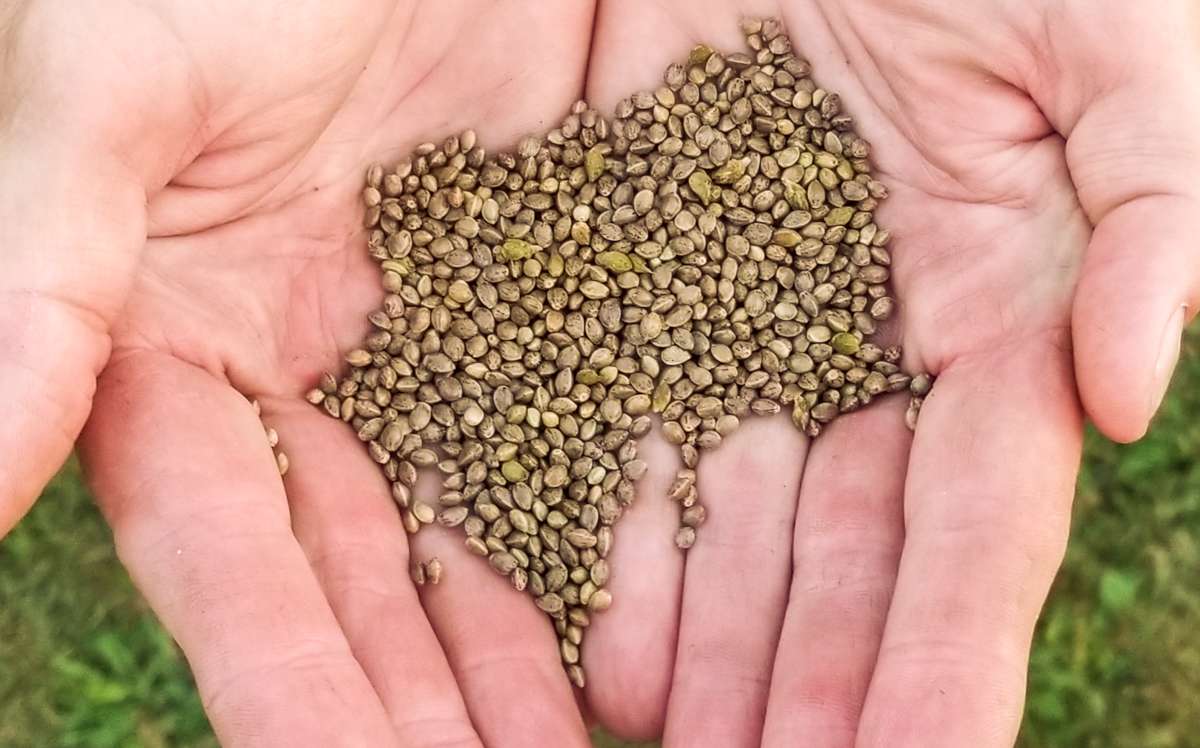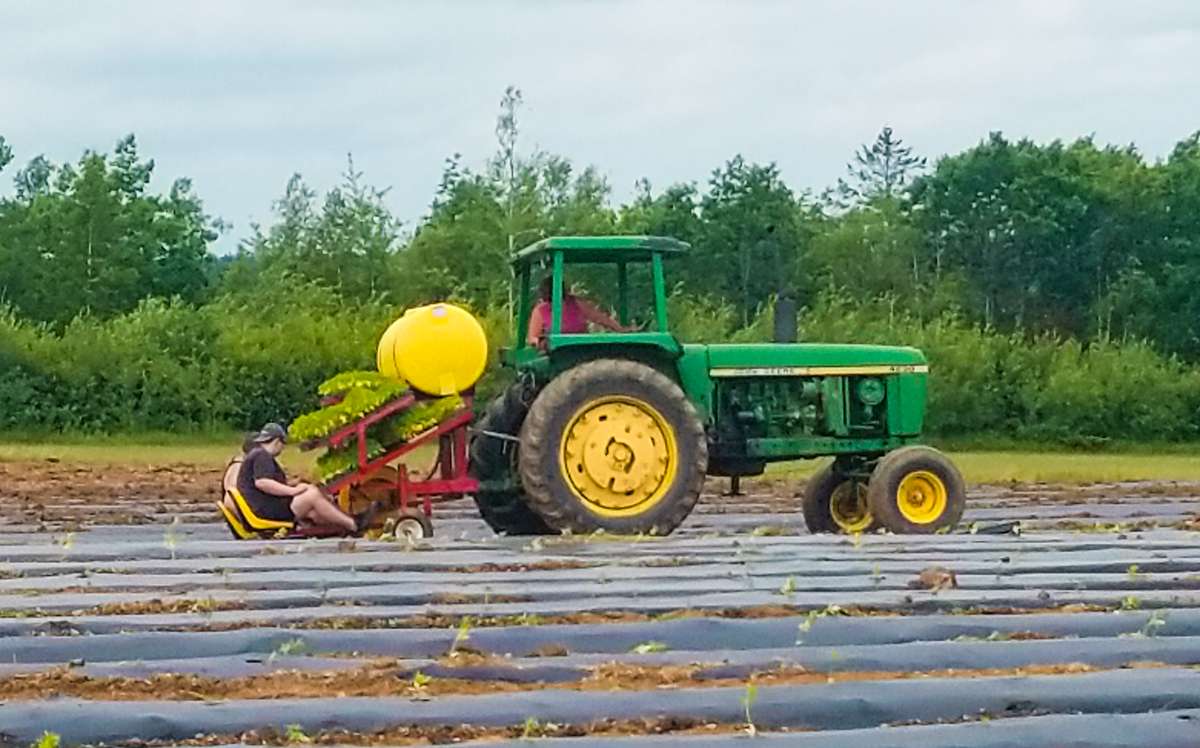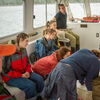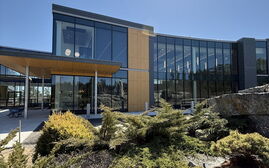
Maine entrepreneur harvests a new idea for startup
 Photo / Maureen Milliken
Dylan Veilleux has been working on finding a way to turn unused hemp stalks into energy. Now his hemp pellet fuel product is on the verge of becoming a reality.
Photo / Maureen Milliken
Dylan Veilleux has been working on finding a way to turn unused hemp stalks into energy. Now his hemp pellet fuel product is on the verge of becoming a reality.
Dylan Veilleux has been working for years on how to turn discarded hemp stalks into an efficient energy product.
It’s been a journey through discarded ideas, mentorship, key partners, surprises and course changes. Success could be right around the corner — or well down the road. It’s a path many entrepreneurs know well. For every successful startup, there’s an unheralded journey, like Veilleux’s, to get there.
Veilleux, 22, founder of TreeFreeHeat, is on the verge of seeing a product after years of work to find a use for discarded hemp stalks. He recently partnered with a pellet producer who’s agreed to do a test run on hemp stalk heated pellets. He’s in talks with a pair of central Maine hemp growers.
In the meantime, hemp stalk-based fire starters he created to generate a revenue have taken off, winning major customers over the past year.
Still, Veilleux knows that success is not a sure thing.
“I’m often scared,” he says as he sits behind his mother’s house in Waterville. “It’s a good thing to be scared, it shows I’m not ignorant [of the challenges].”
When creating a business, “You should be afraid,” he says.

Sowing the seeds
Veilleux decided he wanted to be an entrepreneur when he was 15. His mother was diagnosed with cancer and, watching his parents struggle with bills, he knew he’d rather depend on himself for his income and ultimately support his parents, too.
He started his first businesses as a student at Somersworth High School, in New Hampshire.
The first was a briefcase-like product intended to replace binders. It didn’t take off.
His next product was Closet Deposit, a monthly clothes rental subscription service, which was more successful. It didn’t last long, though. “I found I didn’t love it,” he says.
By then a freshman at Husson University, he’d hit a crossroad. “I needed to take this seriously,” he says.
While researching a paper, he came across an article about Henry Ford and his decision to use gasoline to power cars rather than hemp ethanol. Veilleux felt there had to be something worthwhile about hemp ethanol for Ford to consider it. It sowed the seeds for TreeFreeHeat.
Trying not to ‘look stupid’
As Veilleux became more interested in the environment and renewable energy, his fascination with hemp grew.
Hemp burns more efficiently than wood and fossil fuels, grows faster and is more sustainable. Its fibrous stalks can be used for paper, construction materials, clothing, biofuels and more. In the U.S., the stalks are generally discarded after the flower, seeds and leaves are used for CBD and other products.
Veilleux’s mentors at Waterville’s Bricks Coworking and Innovation Space. When he began working with R.J. Anzelc and Nick Rimsa, founders of mentorship programs at the business, owned by Anzelc, he was still feeling his way.
“I didn’t want to look stupid with these guys,” he says.
But, he says, Elaine Theriault-Currier at the Central Maine Growth Council, another mentor, provided perspective.
“I told her ‘this is what I want to do,’” Veilleux says. “And she said, ‘If that’s what you want to do, then just do it.’”
Rimsa says Veilleux learned to hone his focus.
“When building something, there are infinite directions to head in,” Rimsa says. “When we first started working together, we talked a lot about what’s most impactful and why. And then understanding what are the necessary steps to getting it done.”
Veilleux ultimately concluded that hemp ethanol is too expensive to produce. He turned to hemp stalk bio bricks. After some work on that, he realized that bio bricks, too, weren’t a good economic choice. He turned to pellets.
Finding partners
Veilleux has partnered with pellet producers Wood & Sons, in Sanford, which will do a test run of the pellets. Because the company is making its own product, Veilleux has to wait until there’s a window in production for the test.
He’s also in talks with hemp farmers Colleen Maguire and Susan Hunter, of Maine TradeHers Market in Unity, an agricultural commodities brokerage focused on supporting women in agriculture.
Maguire owns Silver Highlands Farm, in Plymouth, and Hunter owns Hunters Green Farm in Unity. They lease 10 acres in Unity where they grow hemp. They met Veilleux at this year’s Top Gun competition.
After she and Hunter use the leaf, flower and leaves for their products, the stalk is left behind. No one is set up in Maine to produce anything from the stalk, Maguire says, though on the farm she uses it for compost and has experimented with animal bedding. They liked Veilleux’s focus on turning it into an energy source.
Maguire and Hunter still have to determine if the cost of drying, grinding and storing the hemp for Veilleux’s pellet product would be cost-effective in order to produce it for TreeFreeHeat.

The testing product
Veilleux, waiting to test his product, is teetering between success and starting over. But he knows he’s in a better position than many entrepreneurs. He divides his time between Waterville and his father’s house in Somersworth as he works to complete his MBA at Thomas College.
One substantial step has been the surprise success of the fire starters. He and two friends came up with the product as a way to produce some revenue. They are made of hemp stalk and a soy-based wax.
Veilleux started cold-calling distributors, stores and campgrounds. His first customer was the KOA campground in Bar Harbor. From there, they caught on fast. Terramore Outdoor Resort in Bar Harbor is another customer.
In June, TreeFreeHeat signed a distribution deal with Back40, a three-year-old startup that operates an outdoor gear ecommerce site launched in 2017 by Henry Gilbert.
Like the connection with farmers Maguire and Hunter, the partnership was forged in Maine’s energetic startup community. Both Veilleux and Gilbert were contestants in the “Greenlight Maine” pitch competition. They formalized their connection at a Central Maine Tech Night in Waterville.
‘He’s someone who can make this work’
Maguire says that Veilleux’s tenacity and focus are also what gave them the confidence to partner with him.
“We see Dylan listening, he’s absorbing everything,” she says. “He’s someone who can make this work.”
Rimsa says that when he starts working with someone, “an important focus is learning to be comfortable with change.”
“Building things is really about being a detective,” he says. “I’ve learned that the people who make the most progress are the ones that are most comfortable with adapting. Keeping an open mind to being wrong and adjusting to reality is exactly what separates Dylan from most everyone else.”
Rimsa says Veilleux is also fearless about experimenting with different products and customers. “But it’s the dedication he applies once he discovers what works that has propelled TreeFreeHeat’s growth.”
Once Veilleux finds success, he “quickly develops and documents processes, sets stretch objectives, and works tirelessly to outperform,” Rimsa says. “He doubles down on what works and forgets the rest.”
While others see the hard work and ability to grasp the process that’s gotten Veilleux this far, the entrepreneur sees not so much the small steps as a bigger picture.
“What I love is to find a path I haven’t been on, and there are a lot of cool views,“ he says. “And I keep going to see what’s there.”
Mainebiz web partners
Dylan Veilleux’ startup venture, converting waste hemp straw into fuel pellets, is exciting – I wish him all success. But my experience working with UMPI colleagues to evaluate the potential of perennial grasses as a biomass feedstock points to several limitations that may apply to pelletizing hemp straw. Three core technical problems are the high ash content of combusted grasses, chlorine compounds that corrode pellet boilers and flues, and the poor cohesive quality of 100% grass pellets (they tend to disintegrate with transport & handling). The main economic obstacles are the high cost of transporting low value bulk straw to distant pellet manufacturing facilities and the roughly 20% lower market price paid for grass pellets compared to wood pellets. With luck, not all of these will be obstacles for Veilleux’ and with pluck, he’ll find solutions to the ones that remain. David Vail
















2 Comments